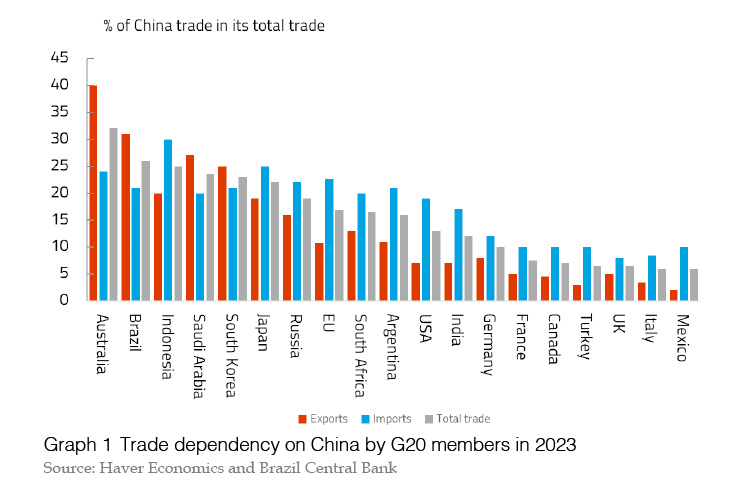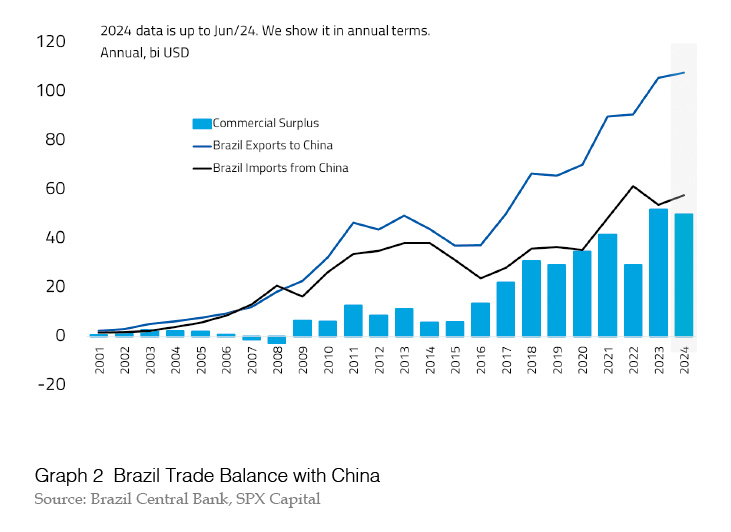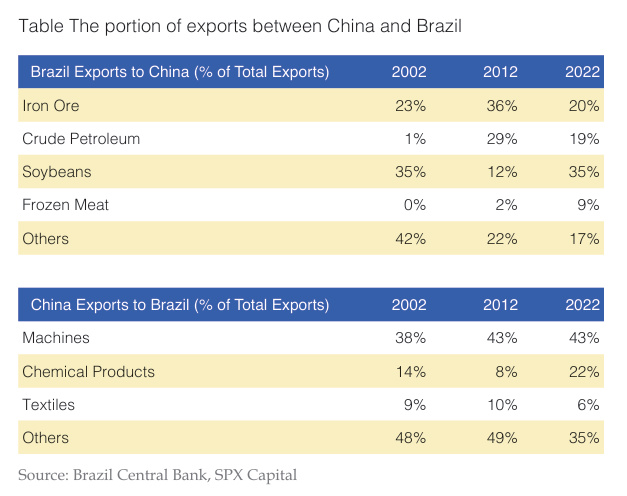Financial and Capital Market Cooperation as the Next Growth Engine in...
Title: Financial and Capital Market Cooperation as the Next Growth Engine in China-Brazil Economic Cooperation
Author: XIE Yizhe and Paulo Capeleti
The relationship between China and Brazil is among the most significant bilateral partnerships on the global stage, particularly within the framework of South-South Cooperation (SSC) amidst evolving world dynamics. These two nations are united by their substantial size, complementary economic structures, and shared aspirations for a multipolar world order, which has driven a robust surge in trade and investment flows. Despite these strong ties, however, capital market cooperation remains in its early stages, presenting a promising area for future growth in their bilateral relationship.
China, the largest developing economy in the Eastern Hemisphere, and Brazil, the largest in the Western Hemisphere, share numerous similarities. Both countries possess vast populations (world’s 2nd and 7th largest), extensive land areas (world’s 3rd and 5th largest), and are classified by the World Bank as upper-middle-income economies. They also lead regional economic integration efforts, with China participating in the Regional Comprehensive Economic Partnership (RCEP) in Asia, and Brazil in Mercosur in Latin America. Furthermore, as two of the world’s top 10 economies, they are influential members of key international groups such as BRICS and the G20, playing prominent roles on the global stage.
The year 2024 marks a pivotal moment in China-Brazil relations. Brazil is set to host the G20 Leaders' Summit in Rio de Janeiro this November, a significant event in the global political calendar. Additionally, 2024 commemorates the 50th anniversary of the establishment of diplomatic relations between China and Brazil. To celebrate this event, both governments have organized a series of commemorative activities at various levels. In June, Brazilian Vice President Geraldo Alckmin visited China, where he was received by President Xi Jinping. President Xi is also expected to make a state visit to Brazil in November, underscoring the importance and potential elevation of this bilateral relationship.
This article aims to provide a timely assessment of the China-Brazil economic relationship. It is structured into four parts. The first part discusses the significance of this relationship to both countries. The second part offers an overview of the bilateral relationship from trade and investment perspectives. The final section highlights the necessity of financial and capital market integration as a crucial step in further deepening the bilateral ties.
Why bilateral relationship is important for both countries?
China and Brazil are natural partners on the global stage. The importance of the relationship is crucial for both countries. The multifaceted relationship between China and Brazil exemplifies a strategic partnership founded on mutual benefit across economic, geopolitical, and environmental domains, all of which contribute to their mutual growth and influence on the world stage.
Most importantly, the economic ties are highly complementary. Brazil possesses abundant reserves of key commodities like soybeans, iron ore, and crude oil, which are crucial for China's industrial and agricultural sectors, supporting its vast population and ongoing urbanization and industrialization efforts. This robust trade partnership is exemplified by China being Brazil’s largest trading partner by far and Brazil being China’s largest trading partner in Latin America. China's share of Brazil’s total trade ranks second only to Australia among G20 nations (see Graph 1).

Beyond trade, China's expertise as the world’s largest manufacturer and infrastructure builder over the past four decades positions it to support Brazil’s developmental initiatives, such as President Lula’s “New Industrial Plan” and “New Growth Acceleration Plan.” China’s favourable financing conditions and low interest rates, stemming from high savings rates (in contrast with Brazil), further facilitate significant investments in Brazil such as recent projects by BYD and State Grid Corporation of China.This economic synergy has led to increased engagement between Chinese and Brazilian companies, underscoring the growing strategic partnership.
Geopolitics represents another critical area where China and Brazil can find common ground. Both nations aim to amplify the voice of the global south and promote a multipolar world order through platforms like BRICS and the G20. Brazil's historically neutral stance in international politics has fostered a particularly favourable relationship with China, which prioritizes strengthening ties with Brazil amid a rapidly changing world. Brazil is arguably the most neutral and China-friendly country among the top 10 economies. Brazil, in turn, benefits from China's support in advancing its global influence, including reforms within the United Nations.
Moreover, environmental, social, and governance (ESG) initiatives serve as additional pillars enhancing their bilateral relations. China has set up an ambitious goal to achieve carbon neutrality by 2060 and is positioning itself as a leader in clean energy (solar panels and EVs), and in global climate change efforts. Brazil is the host of the world’s largest forest – the Amazon rainforest and Brazil’s vast natural resources are crucial in regulating the Earth's climate, a major focus of international environmental efforts. Collaborative efforts in environmental technology and green infrastructure not only deepen economic cooperation but also address pressing global ESG challenges.

Overview of the bilateral relationship from trade and investment perspectives
The trade relationship between Brazil and China started modestly in the 1970s and 1980s, a period when China began its economic reforms, and Brazil faced challenges like high inflation and structural balance of payments issues. The bilateral trade gained significant momentum in the early 2000s, particularly after China joined the WTO in 2001 and Brazil stabilized its macroeconomic environment with the success of the Real Plan and other reforms in the 1990s.
By the year China joined the WTO, the total bilateral trade (including Hong Kong) between the two countries was only US$4 billion. This figure grew to US$59 billion by 2010 and reached US$165 billion in 2023, marking a 40-fold increase since the early 2000s. While exports from both countries have increased significantly during this period, the bilateral trade balance has been more favorable for Brazil, maintaining a trade surplus with China since 2009, primarily driven by commodity exports. In 2023, the Brazilian trade surplus with China reached approximately US$ 50 billion.
An important characteristic is that the products exported between China and Brazil are fundamentally different, and the export agenda between the two countries has become increasingly distinct, suggesting Brazil's growing specialization in commodity production while China has excelled more in capital-intensive industrial goods.

In 2022, exports of iron ore, petroleum, soy, and beef accounted for 83% of the total exports to China. In 2002, however, these products comprised about 60% of Brazilian exports to the Asian country. In the case of China, the highlights in 2022 were exports of machinery and equipment and chemical products to Brazil,

